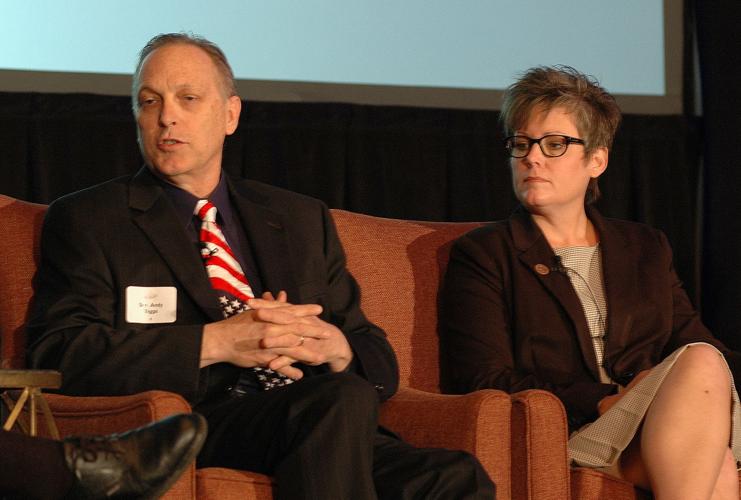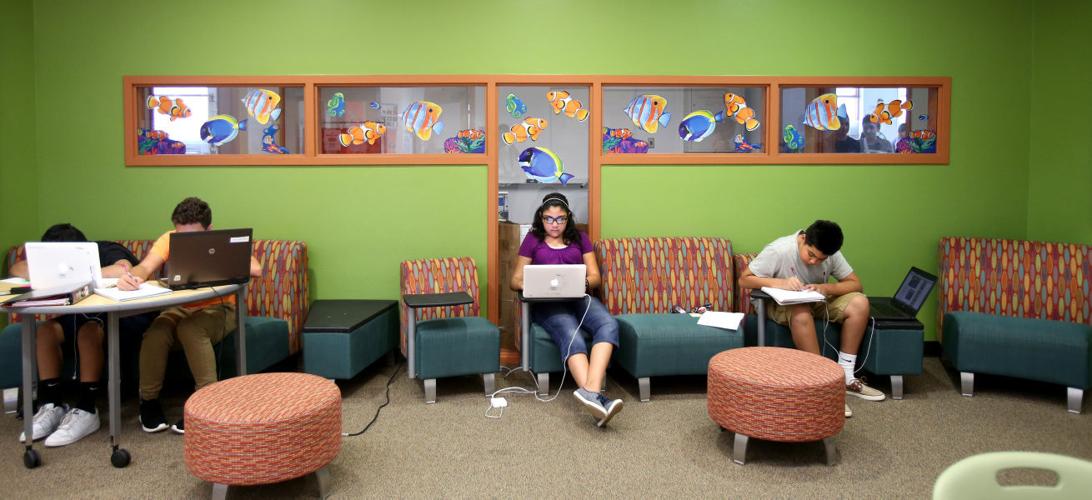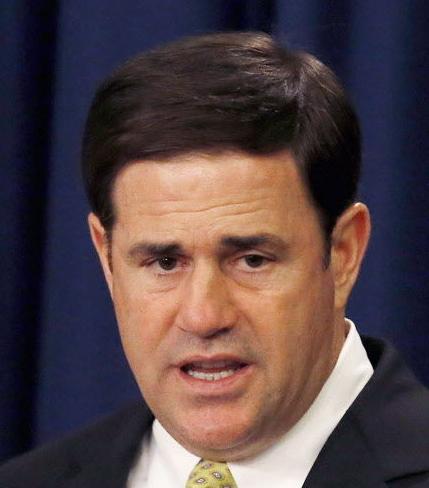PHOENIX — There’s a twist this year to what has been the perennial big fight at the Capitol over money.
Arizona has too much of it.
And that has lawmakers staking out positions about what needs to be spent and on whom — and how much should be set aside in tax cuts.
The discussion about reducing taxes is virtually certain in the new legislative session, which begins at noon Monday.
In fact, Gov. Doug Ducey said he will fulfill the promise he made during the campaign of proposing a tax cut every year.
But on the heels of years of record cuts to K-12, community college and university funding, proponents — including the governor — are trying to put a different spin on it.
“I would look at it as tax reform,” he said. “Reform is a word that’s used a lot in public policy,” Ducey explained. “To me, it means improvement.”
But the governor is not hiding what direction his reform would take.
“I believe that we should have a lower tax base,” he said.
Democrats are pushing hard to restore much of what’s been cut during the recession, particularly from state aid to public schools.
They acknowledge that voters may approve Proposition 123 at a special election in May, a move that would put an additional $3.5 billion into public schools over the next decade.
They say, however, that’s mainly designed to make up for the failure to provide inflation aid to schools as required by a 2000 voter-approved measure. Anyway, that lasts only through 2025 — and comes down to only about $300 per child per year.
That’s significant because legislative budget reports put state aid per-student at $4,657 in 2007 — and $4,242 now, even before accounting for inflation.
Then there are the universities, which took a $99 million hit this school year.
The argument for restoring some funding is buttressed by the fact that all the cuts made in last year’s budget left Arizona with a $325 million surplus. And with just five months of data this fiscal year, revenues are running about $200 million ahead of forecast.
But it won’t be just the Democrats looking for more money.
While lawmakers have put new dollars into the Department of Child Safety, the agency has so far been unable to wipe out its backlog of “inactive” cases. These are open cases where no social worker or staffer has looked at the file — or looked in on the child — in at least 60 days.
And it is not yet clear whether a healthier economy will mean that enrollment in the state’s Medicaid program will finally stabilize. About a third of the price tag comes from state revenues.
Lawmakers are also being pushed to once again open enrollment into the Kids Care program, a branch of Medicaid that provides health insurance to the children of working poor.
Regular Medicaid covers families up to 138 percent of the federal poverty level, $27,724 for a family of three. Kids Care covers the children up to 200 percent, or $40,180.
New enrollment was halted in 2010 as part of the budget crunch, but the Children’s Action Alliance is urging reversal of that.
TECHNICAL TRAINING
There are two other fights looming over a small aspect of the education system.
Arizona law allows creation of “joint technical education districts.” These are essentially special school districts formed by other districts to offer special programs that may not make sense for any one district to offer.
The idea is to offer career and technical education to provide students who will not be going on to college with skills that could help them get a job after graduation, like cosmetology or welding, often providing them with the necessary certification.
But Senate President Andy Biggs said the programs have blossomed into other areas where there is no career at the end, at least not without further education. One example is law enforcement.
And the state provides additional aid for some programs that may be offered at satellite campuses, even if some of the courses taught, like history, are the same ones offered at regular high schools. Biggs hopes to narrow the focus — and trim what he says are excess and unnecessary state dollars.
JTEDs are already in a defensive position. State lawmakers approved a $30 million cut last session, set to take effect this coming school year. The net effect, according to schools, would be to drop state aid to 92.5 percent of current levels.
Efforts to restore JTED funding and prevent other cuts are likely to be led by members of Biggs’ own party, who see these programs as a viable alternative to forcing all students to go on to college. They are also likely to be backed by the business community, which has been very supportive of having graduates qualified to fill jobs.
A separate battle is shaping up over already-approved moves to fund schools on estimated current year enrollment versus the number of students each had last year. That particularly hurts districts with declining enrollment.
ABORTION, PLANNED PARENTHOOD FUNDING
Social issues could also dominate debate. And these usually start with abortion.
Foes have been working to restrict the procedure since the U.S. Supreme Court first declared in 1973 that women have a constitutional right to terminate a pregnancy, at least in the first trimester.
Unable to outlaw abortion outright, the legislation normally takes the form of creating new hurdles, ranging from waiting periods and ultrasound requirements to what procedures can be used.
The record has been mixed. Federal judges have upheld some limits. But they have repeatedly struck down those they say impose significant — and therefore illegal — burdens on a woman’s constitutional rights.
This year the fight will play out on another level: a bid by some legislators to eliminate all state dollars going to Planned Parenthood.
Both state and federal law prohibit the use of tax dollars for elective abortions. But Planned Parenthood gets some state dollars through the Medicaid program to provide family planning services.
Abortion foes argue that any money to Planned Parenthood effectively subsidizes its abortion services.
A prior bid to deny family planning funds to the organization was struck down by a federal appeals court, which noted that Medicaid regulations allow patients to get their services from any qualified provider.
Despite that, some Republicans are crafting a measure they contend will withstand legal challenge.
NURSES’ ROLES
Another medical issue likely to provoke debate is an effort by some nurses to get more privileges.
A legislative committee has recommended that state laws be changed to allow “advanced practice nurses” to do some things now reserved for doctors.
More areas would be provided where nurses could work independent of direct doctor supervision, such as administering anesthesia.
The nurses are being backed by Arizona hospitals that see the move as a way of keeping costs down. But the Arizona Medical Association is lobbying heavily against the change, saying even nurses with advanced training lack the same qualifications as someone who has been to medical school.
GUN RIGHTS
It wouldn’t be a session of the Arizona Legislature if lawmakers did not debate who can have guns and where they can take them.
Lawmakers already loosened concealed-carry laws to the point where any person can have a hidden weapon.
But those who want to can still get a specific permit after undergoing a background check and some training.
One advantage of having a concealed-carry permit is the ability to take a gun into a place where alcohol is sold, though those who are armed are not supposed to drink.
Now there is a move to extend that right to faculty and students at public universities and community colleges, places where all weapons are now considered off limits.
ELECTIONS
Election-related matters also will get attention.
Republicans will make another bid this year to halt what they call “ballot harvesting.”
Current law allows a voter who gets an early ballot to give it to anyone else to return to the polling place. GOP lawmakers contend that opens the door to fraud, claiming that liberal groups with certain agendas can figure out who voted which way and then simply discard the ballots that take a contrary position.
But Democrats see the move as an effort to disenfranchise minority communities.
Separately, the Secretary of State’s Office is preparing a series of changes in campaign finance laws, including who has to report and how often.
MISCELLANOUS ISSUES
Other issues likely to provoke debate include:
- Reforming the pension systems for public employees to make the funds more financially sound;
- Requiring motorcycle riders to wear helmets;
- Having the state mine inspector appointed instead of being elected;
- Altering laws on who can use medical marijuana;
- Deciding whether police should be required to have body cameras, spelling out when they have to be turned on, and determining whether the videos are a public record;
- Determining whether to limit how much of their tax liability corporations can divert in donations to organizations that help children attend private and parochial schools;
- Fixing conflicting laws over whether the Board of Education or the state schools chief controls board employees;
- Allowing parents to exempt their children from standardized tests at schools;
- Repealing requirements for state and local governments to publish certain legal notices in newspapers.







